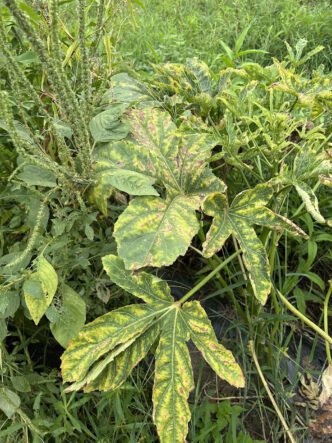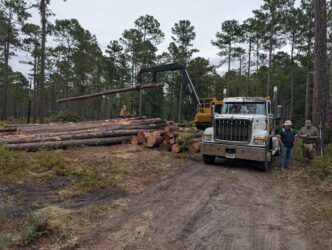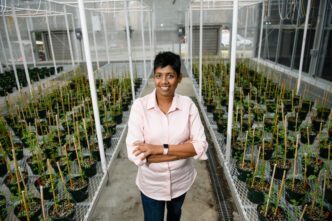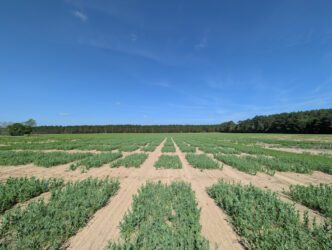GREENVILLE – Routine federal inspections of large produce farms begin in the United States this spring and Clemson Extension agents are helping teach South Carolina produce growers what they need to do to comply with the Produce Safety Rule.

Growers from the Upstate met with Clemson Extension and South Carolina Department of Agriculture agents for a full day of lessons that emphasized food safety and environmental management goals, as well as requirements of the Produce Safety Rule regulation of the Food Safety Modernization Act (FSMA). The grower trainings come after an agreement between the U.S. Food and Drug Administration (FDA), Clemson University and the state Department of Agriculture to train South Carolina produce growers how to comply with this new regulation.
“This Produce Safety Rule shifts the focus from responding to contamination to preventing them,” said Chad Carter, a Clemson Extension food systems and safety associate from Charleston. “Inspections begin this spring on farms that aren’t exempt from this rule and we want to help South Carolina produce growers know what is expected of them and their farms.”
This new regulation sets a series of science-based minimum standards for safely growing, harvesting, packing and holding fruits and vegetables for human consumption. The FDA has set standards for worker health, hygiene and training, agricultural water, biological soil amendments, sprouts, wildlife and domesticated animals, as well as equipment, tools and buildings.
Exempt farms make less than $25,000 from the sale of produce. Growers may also be eligible for exemption if they sell to qualified end-users, including selling directly to consumers, restaurants or retail food establishments such as grocery stores and farmers markets. South Carolina farms that qualify for exemption from this rule must apply annually for exemption status with the South Carolina Department of Agriculture. For more information, see http://bit.ly/FSMAInflationAdjustedCutoffs. Farms certified in Good Agricultural Practices, or GAPs, still will have to comply with the Produce Safety Rule standards because GAP is a voluntary program and the FSMA Produce Safety Rule is mandatory.
“Even if you are exempt, you should still follow food safety practices on your farm,” Carter said. “This includes having a farm safety plan.”
Because safety plans should be farm-specific, proper record-keeping is a must. Julie Northcutt, a Clemson professor and Extension Food Systems and Safety Programs Team leader, advised participants to determine a record-keeping system that will work best for them.
“Document everything you do so that if you are asked about something, you can check your records and know exactly what you did for the situation in question,” Northcutt said.
The Greenville training is one of a number of trainings planned for South Carolina growers to help them prepare for the FDA inspections. A Produce Safety Grower Training course also will be held April 3 at the Clemson Horry County Extension Office, 1949 Industrial Park Road, Conway, SC 29526. Trainings will be held in Orangeburg and Columbia next and will be held throughout the state for the next several years. For information about these trainings, contact Chad Carter, Clemson Extension, ctcarte@clemson.edu, 843-730-5211, or Brooke Horton, SCDA Produce Safety, Bhorton@scda.sc.gov, 803-351-1244. Scheduled trainings also can be found at http://bit.ly/SC_GrowerTraining.
To help prepare the state’s produce growers even more, the South Carolina Department of Agriculture and Clemson Extension Service are providing 0n-farm readiness reviews. There is no charge for these confidential reviews, which can be done to help growers know what changes are needed prior to inspections. To request a review, go to http://bit.ly/OnFarmReview. A list of guidance documents to show what will be observed by inspectors is available at http://bit.ly/FDAProduceStandards.
Inspectors will use the form found at http://bit.ly/ProduceFarmObservations to record their findings.
The Food Safety Modernization Act was passed in 2011. This regulation focuses on setting the first-ever federal regulatory standards for the production, harvest and handling of fruits and vegetables. These standards are an effort to prevent microbial contamination and reduce foodborne illnesses associated with fresh produce.
In addition to the Produce Safety Rule, the FSMA encompasses six other regulations including the: Preventive Controls for Food for Human Rule, Preventive Controls for Food for Animals Rule, Mitigation Strategies to Protect Food Against Intentional Adulteration Rule, Sanitary Transportation of Human and Animal Food Rule, Foreign Supplier Verification Programs Rule, and Accredited Third-Party Certification Rule.
Clemson Extension has trainings planned for Preventive Controls for Animal Food on:
- April 9-11 at the Greenville County Clemson Extension Office, 301 University Ridge, Suit 4300, Greenville, S.C. 29601
- Sept. 11-13, at the Clemson Applied Technology Building, 511 Westinghouse Rd, Pendleton, S.C. 29670
- Nov. 4-6 – Greenville County Extension Office, 301 University Ridge, Suite 4300, Greenville, S.C. 29601
Cost for this training is $495 and includes textbook, exercise book, lunch and break refreshments.Trainings planned for Preventive Controls for Human Food will be held on:
- March 26-28 – Clemson Applied Technologies Building, 511 Westinghouse Road, Pendleton, S.C. 29670
- April 14-16 – Clemson Applied Technologies Building, 511 Westinghouse Road, Pendleton, S.C. 29670
Cost for each training is $495 and includes textbook, exercise book, lunch and break refreshments. For information about these trainings, contact Kimberly Baker, Clemson State Consumer Food Safety Program coordinator, at 864-646-2139, or kabaker@clemson.edu.






